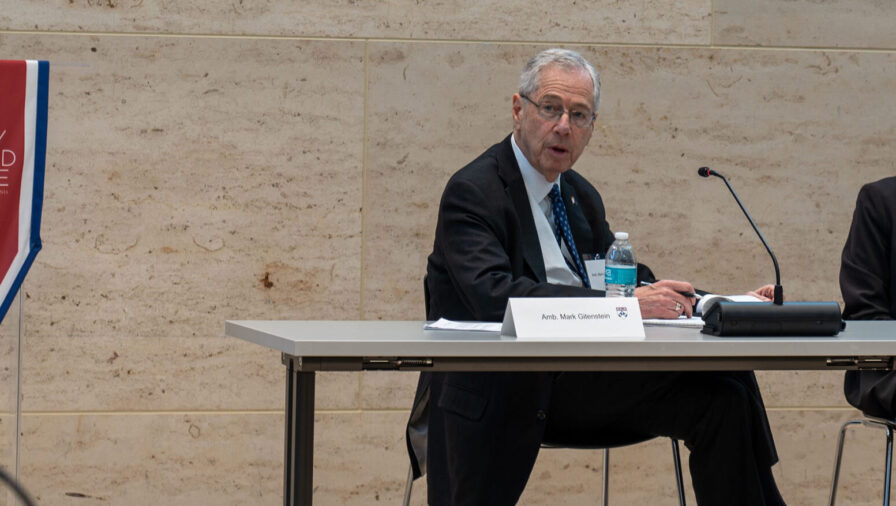Unsurprisingly this past year Russia has deliberately intervened in recent elections in two countries in which I have a particular interest, Romania and Moldova. Not only was I the U.S. Ambassador to Romania from 2009 until 2012, but my ancestors were from Moldova and Romania—both countries have a special place in my heart.
As U.S. Ambassador to the EU (2022-25), I followed the Russian invasion of Ukraine and its aftermath as part of my work every day as the United States and the EU worked together to hold the Russians accountable. I was not surprised to see the Russians attempt to thwart Moldova’s aspirations to join the EU and to neutralize Romania.
Moldova
Maia Sandu has been the President of Moldova since 2020 and has skillfully led the country in a pro-European direction ever since. In June of last year, the EU granted Moldova candidate status to join the Union. Defeating her reelection in October along with a referendum on preserving Moldova’s European path were Russian priorities.
According to the Moldovan Security Services, In the local elections in 2023, the Russians had spent more than $50 million on illegal financing and disinformation. Sandu was the target of deep fakes portraying her as pro-Russian or making offensive comments to certain ethnic groups.
In the October elections, according to one expert, the Russians recruited Ilan Shor, a pro-Russian oligarch subject to U.S. sanctions to lead a comprehensive disruption campaign including: “outright buying of votes,” “cyberattacks, planned espionage at diaspora polling stations.” According to Amelia Benjamin of the McCain Institute, this included manipulation of false Facebook accounts and pouring “huge amounts of money” into ordinary Moldovan citizens’ bank accounts to buy their votes.
The United States and the EU committed significant resources to counter the Russians. Independent polling suggested Sandu would win convincingly as would the referendum. Sandu barely made it past the first round but did win in the runoff however the referendum only passed by 50.4 percent.
Romania
A month later, the Russians tried their hand in Romania with greater success. The president of Romania is charged with national security functions under the Romanian constitution and represents Romania in the European Council where unanimity is required for all foreign policy decisions e.g. on Ukraine. Calin Georgescu was a largely unknown ultra nationalist pro-Russian extremist when the election for president took place in November. A few weeks before the election he barely registered in the polls but on election day led in the first round with over 20 percent.
Installing a pro-Russian president would be a genuine threat to the transatlantic alliance. Romania was planning to host 10,000 NATO troops and already housed a major NATO antimissile site that the Russian’s vehemently opposed.
Georgescu agreed.
The role of social media immediately became suspect. Georgescu claimed to have raised and spent no campaign funds.
Soon after the elections the Romanian intelligence services released redacted intel documents revealing foreign meddling and, along with other sources, that someone allegedly spent $1 million in the eighteen months before the election on TikTok content. Romania asked the EU to use its authority under the Digital Service Act (DSA) to investigate the role of TikTok. One issue it will clearly investigate is how Georgescu managed to get 370,000 supporters in a few weeks.
Reuters on December 4 elaborated on the declassified documents. Romania was the subject of “aggressive hybrid Russian attacks.” According to Romanian intelligence services, Georgescu was “massively promoted on social media platform TikTok through coordinated accounts, recommendation algorithms and paid promotion.”
On December 6, Romania’s highest court annulled the election which has been rescheduled for May. The EU will report shortly on its findings and the Romanian government is conducting its own investigation of potential campaign finance violations. Hopefully both reports will be made public before the voters return to the polls on May 8.
Path Forward
In less than two months two very pro-western countries, one an EU member state, were subjected to intensive Russian election manipulation campaigns. This is clearly a threat to not only the national security of the United States, but to NATO and the EU.
EU has tools with which to address the threat at least to the extent it involves digital media. The United States has no such tools and our constitution, especially the First Amendment, makes a remedy like the EU’s Digital Services Act (DSA) tricky.
A thorough and transparent report by the European Commission explaining the role of the Russians and TikTok released before May 8 along with the findings of Romanian authorities on the campaign finance issue would help voters make an informed decision about the election. But other than the ballot box there may not be another remedy at least right now.
As I think of solutions going forward, I divide the answer into three categories: 1) the EU; 2) the United States, and 3) ordinary citizens.
a. What can the EU do?
The EU has already done a lot. With the enactment of the DSA in 2023 it adopted the most comprehensive scheme for regulating digital media. Notwithstanding allegations by tech CEOs like Elon Musk and Mark Zuckerberg, the DSA is largely a scheme that mandates transparency on large platforms (X, Google, Tiktok). The critics are right that it targets U.S. companies and while as ambassador I argued against that distinction.
Despite the advocacy of U.S. NGOs and opinion leaders like the Washington Post that the United States emulate the EU, it hasn’t and is unlikely to in a Washington dominated by JD Vance and Elon Musk. In fact, there is a principled case to be made that under U.S. constitutional law it may be more difficult to enact a U.S. version of the DSA. I don’t necessarily buy that argument. Recent Supreme court decisions in the Netchoice & TikTok cases certainly don’t overly restrict the First Amendment’s application to digital media. Some of the other actions mentioned by Anne Applebaum in her thoughtful piece in the Atlantic e.g. Brazil’s forcing X off line when Musk refused to stop facilitating misinformation, might not be constitutional in our system.
b. What should the United States do?
Let’s focus here on what the United States shouldn’t do. I obviously cannot and would not speak for the current administration, and what I as a private citizen would advocate it do will carry little weight. But I do think it’s a mistake to turn what is clearly a legal and perhaps even a constitutional issue into a trade issue. It is counterproductive to use our trade tools as a cudgel to get changes in their internet policy.
There are genuine trade issues between the United States and the EU. I and then-U.S. Trade Representative (USTR) Katherine Tai and then-U.S. Secretary of Commerce Gina Raimondo spent hundreds of hours on them in the past three years. The Trump administration should focus on the trade deficit with Europe as we did. It is real and must be addressed.
Trade remedies are primarily for trade issues. To use them in this case for digital policy especially when the primary advocates are tech executives whose business interests are directly affected by the digital policies will simply diminish the credibility of the legacy trade disputes. And it will play into the hands of anti-American sentiment that has too much sway in European politics as it is.
C. What should we, those of us out of government, do?
The EU is not likely to enact a broader and even more aggressive DSA; the current administration will indeed attempt to force the EU to dismantle it and U.S. government advocacy for countering Russian meddling in digital media will be tepid at best.
Our work should be focused on one simple truth as a recent study from the Carnegie Endowment for International Peace (www.carnegieendowment.org) suggests: one institution that can make a difference is a strong, resilient independent press. The best answer to disinformation is more truthful information that points out the lies.
But as President Biden said in his farewell address, in the face of the threat of oligarchy here and in Europe “the free press is crumbling.” With the current approach of the Trump foreign policy, the tradition of FDR and the “four freedoms” or Reagan and the “shining city on a hill” may be over for now. It’s our job to keep those bedrock principles alive, especially as they relate to free and independent media.
In the United States, as the Medill Journalism School at Northwestern points out, huge “news deserts” exist as local journalism dies. Similar deserts exist in the EU as a recent EU study shows . But the biggest problem in Europe is captured media (independent media co opted by autocratic regimes).
“Crumbling media” on both sides of the Atlantic is also a market failure as business models for legacy media are failing. It’s the reason that independent media are vulnerable to “buy outs” by oligarchs like Orban in Hungary who upon his election in 2010 simply got his friends to buy up most of independent media.
The experts speak of this co-option in the context of the deterioration of “media plurality.” In the case of our two case studies, Moldova and Romania, media plurality is under siege. Reporters without Borders (RBC) measures media pluralism throughout Europe on a regular basis.
According to RBC the results for both countries are better than Hungary but still disturbing. For example, its narrative on Moldova is that Ilan Shor, mentioned earlier as the pro-Kremlin oligarch behind the Russian meddling scheme, still controls a significant media empire despite partially successful efforts by the Sandu government to break his monopoly.
In Romania according to RBC, “media funding mechanisms are often opaque, even corrupt.” Yet it was a hardy group of independent journalists at thinly resourced digital platforms that forced the Romanian government to declassify the TikTok documents.
While I was U.S. Ambassador in Brussels our mission spent a lot of time and energy on this problem. I spoke of it in my closing remarks in a forum hosted by POLITICO Europe.
The only sustainable & reliable strategy for preserving and enhancing independent media is the private sector. As recent events demonstrate, we can’t depend on USAID (which was involved in preserving independent media in Europe). The basic message is that the EU needs to treat independent media like we are treating electric vehicles: a market failure. We need to convince the EU to create risk mitigating regimes e.g. like subsidies and tax credits to encourage equity investors to place safer bets on independent media.
This problem and its solution are beyond the scope of this paper or this conference but it will be part of a project I hope to convince the Perry World House, the Annenberg School and possibly even Wharton to focus on. Nothing less than our democracy and the stability of the Atlantic alliance are at stake.




